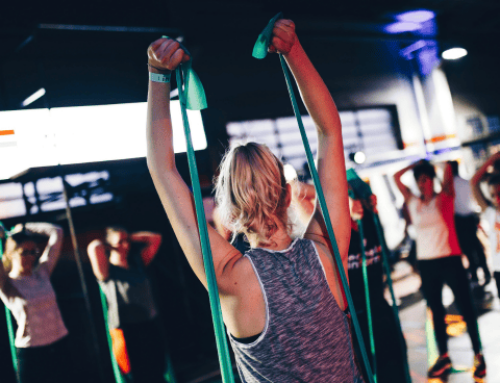7 Reasons Why You're Not Getting Stronger

Poor Nutrition
Growth is fueled by proper nutrition, meaning a balanced diet is the most effective way to promote strength gains. The most common diet mistakes are not eating often enough and not eating at the proper times. It’s key to give your body what it needs when it needs it. Don’t make it complicated. Just eat the proper balance of protein, carbohydrates, fruits and vegetables and healthy fats. (Here are 10 Nutrition Rules To Live By.)
Inadequate Water Supply
Another simple but critical component of a proper eating regimen is drinking enough water. Again, aim for simplicity. All those sport shakes, shooters and energy boosters should be secondary to water. Another tip: as an athlete, you must exceed the recommended eight to 10 glasses of water a day. Training demands more of your body and thus requires more water intake. Minimum intake will produce minimum results. Consume water continually throughout the day, with the goal being a gallon each day. Water is also important for cooling the body during activity, because an elevated body temperature can impact performance.
Insufficient Sleep
Many athletes don’t allow enough time for their bodies to repair themselves through proper rest. Choosing to downplay rest as a part of building strength is a poor choice. Real strength is created in the bed. Muscle is broken down during a workout, and new, stronger muscle is formed during sleep. Overtraining is one of the most common reasons why athletes are unable to reach their strength potential. You can literally sleep your way stronger by getting eight or more hours of sleep per night—and even taking naps of 30 minutes to an hour daily.
Napping has been shown to have the same muscle building benefits as many popular supplements on the market today. Getting sufficient rest is not as exciting as a new training routine, but it’s an important part of building strength. (Read Secrets for Better, Muscle-Building Sleep.)
Unbalanced Training
Your current routine may be what’s preventing you from getting stronger. Any decent program consists of routine pushing and pulling movements to ensure good body balance and overall strength. For example, training chest and back on the same day incorporates a push and a pull.
The mistake of many old school training programs is working chest and triceps—i.e., training two muscle groups essential to push movements—meaning that one or both areas cannot be worked to their maximum capacity. If your chest training is the priority, then training your triceps will suffer. Balance in training will speed results.
Group training days to maintain balance of push and pull movements. Here is a simple way to pair muscle groups for effective training and improved results:
- Quadriceps & Hamstrings
- Chest & Back
- Biceps, Triceps & Shoulders
Weak Commitment
Commitment to consistent training will make you stronger, guaranteed. Quality muscle is not created in a single day. To get stronger, you must train, train and train some more. A dedicated athlete must have a long-term view of his or her strength goals. It’s not about how much stronger you can get in a few weeks, but over the course of a year and for many years to come. To better assess your strength and muscle gains, measure your results every month. You cannot neglect your nutrition, recovery or training and expect optimal gains. Champions are made over time. To be elite you must be committed to the goal that you seek to achieve.
The Fear Factor
One of the biggest factors preventing you from being stronger right now could be fear—and fear has many faces. Some athletes dislike trying anything new or unfamiliar, training outside their comfort zone or depending too much on what others think of their training. Remember, you are training for yourself, so your routine should be suited to your unique needs. It might not be popular to go against what others around you are doing, but it’s important to do what’s necessary for your individual performance. Fear is usually the largest obstacle in reaching ultimate strength.
Fuzzy Focus
To become stronger than you were yesterday, you must train harder and smarter than you did yesterday. Strength is built by moving beyond your normal capacity. In order for improvements to be made, athletes must admit their weaknesses, then focus on curing them. A good rule of thumb when it comes to training is to work what you hate. If you hate training legs, that is exactly what you should focus on. Chances are the muscles you enjoy training are overdeveloped, and those you skip training are underdeveloped.
photo:bodybuilding.com
RECOMMENDED FOR YOU
MOST POPULAR
7 Reasons Why You're Not Getting Stronger

Poor Nutrition
Growth is fueled by proper nutrition, meaning a balanced diet is the most effective way to promote strength gains. The most common diet mistakes are not eating often enough and not eating at the proper times. It’s key to give your body what it needs when it needs it. Don’t make it complicated. Just eat the proper balance of protein, carbohydrates, fruits and vegetables and healthy fats. (Here are 10 Nutrition Rules To Live By.)
Inadequate Water Supply
Another simple but critical component of a proper eating regimen is drinking enough water. Again, aim for simplicity. All those sport shakes, shooters and energy boosters should be secondary to water. Another tip: as an athlete, you must exceed the recommended eight to 10 glasses of water a day. Training demands more of your body and thus requires more water intake. Minimum intake will produce minimum results. Consume water continually throughout the day, with the goal being a gallon each day. Water is also important for cooling the body during activity, because an elevated body temperature can impact performance.
Insufficient Sleep
Many athletes don’t allow enough time for their bodies to repair themselves through proper rest. Choosing to downplay rest as a part of building strength is a poor choice. Real strength is created in the bed. Muscle is broken down during a workout, and new, stronger muscle is formed during sleep. Overtraining is one of the most common reasons why athletes are unable to reach their strength potential. You can literally sleep your way stronger by getting eight or more hours of sleep per night—and even taking naps of 30 minutes to an hour daily.
Napping has been shown to have the same muscle building benefits as many popular supplements on the market today. Getting sufficient rest is not as exciting as a new training routine, but it’s an important part of building strength. (Read Secrets for Better, Muscle-Building Sleep.)
Unbalanced Training
Your current routine may be what’s preventing you from getting stronger. Any decent program consists of routine pushing and pulling movements to ensure good body balance and overall strength. For example, training chest and back on the same day incorporates a push and a pull.
The mistake of many old school training programs is working chest and triceps—i.e., training two muscle groups essential to push movements—meaning that one or both areas cannot be worked to their maximum capacity. If your chest training is the priority, then training your triceps will suffer. Balance in training will speed results.
Group training days to maintain balance of push and pull movements. Here is a simple way to pair muscle groups for effective training and improved results:
- Quadriceps & Hamstrings
- Chest & Back
- Biceps, Triceps & Shoulders
Weak Commitment
Commitment to consistent training will make you stronger, guaranteed. Quality muscle is not created in a single day. To get stronger, you must train, train and train some more. A dedicated athlete must have a long-term view of his or her strength goals. It’s not about how much stronger you can get in a few weeks, but over the course of a year and for many years to come. To better assess your strength and muscle gains, measure your results every month. You cannot neglect your nutrition, recovery or training and expect optimal gains. Champions are made over time. To be elite you must be committed to the goal that you seek to achieve.
The Fear Factor
One of the biggest factors preventing you from being stronger right now could be fear—and fear has many faces. Some athletes dislike trying anything new or unfamiliar, training outside their comfort zone or depending too much on what others think of their training. Remember, you are training for yourself, so your routine should be suited to your unique needs. It might not be popular to go against what others around you are doing, but it’s important to do what’s necessary for your individual performance. Fear is usually the largest obstacle in reaching ultimate strength.
Fuzzy Focus
To become stronger than you were yesterday, you must train harder and smarter than you did yesterday. Strength is built by moving beyond your normal capacity. In order for improvements to be made, athletes must admit their weaknesses, then focus on curing them. A good rule of thumb when it comes to training is to work what you hate. If you hate training legs, that is exactly what you should focus on. Chances are the muscles you enjoy training are overdeveloped, and those you skip training are underdeveloped.
photo:bodybuilding.com











